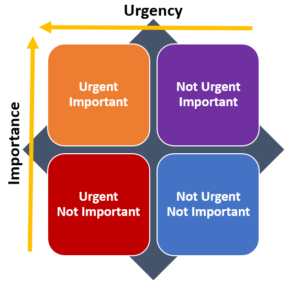Have you ever felt like there just aren’t enough hours in the day to tackle your never-ending to-do list at work? Do deadlines sneak up on you, leaving you struggling to finish tasks at the last minute? If so, it’s time to take control of your workday and supercharge your time management strategies and skills.
Effective time management is necessary for productivity and success in today’s fast-paced professional world. It allows you to prioritize tasks effectively, easily meet deadlines, and maintain a positive work-life balance. So how can you improve your time management skills?
The answer lies in adopting proven strategies that will help you optimize your workflow, stay organized amidst the chaos, and make the most of every precious minute. From setting clear goals to utilizing productivity tools and techniques like prioritization and delegation, we’ll explore practical tips that will transform the way you approach your work.
Get ready to reclaim control over your schedule and maximize your productivity by mastering time management at work.
1. Set Clear Goals for Better Time Management Strategies
Setting clear goals is one of many effective time management strategies. Start by identifying your short-term and long-term objectives at work. Break down these goals into smaller, manageable tasks with specific deadlines. This way, you’ll have a clear roadmap of what needs to be done and when it needs to be completed.
When setting your objectives, make sure they are SMART: Specific (clearly defined), Measurable (quantifiable), Achievable (realistic), Relevant (aligned with your overall objectives), and Time-bound (have a deadline).
2. Prioritize Tasks

Important Urgent Matrix
Not all tasks are created equally; some hold more significance than others in terms of impact or urgency. Learn how to prioritize your workload by categorizing tasks based on importance and deadline proximity.
One well-known method is the Eisenhower Matrix, which involves dividing tasks into four categories:
- Urgent & Important: These are top-priority tasks that require immediate attention.
- Important but not Urgent: These are important long-term projects that should be scheduled accordingly.
- Urgent but not Important: Delegate these tasks or automate them whenever possible.
- Neither Urgent nor Important: Minimize or eliminate these non-value-adding activities from your schedule.
By prioritizing effective time management strategies using frameworks like the Eisenhower Matrix, you can focus on high-priority activities first while ensuring nothing falls through the cracks.
3. Plan Ahead for Better Time Management Strategies
Proper planning ensures that valuable working hours are well-spent due to indecision or lack of direction during the day. Take a few minutes every evening or early morning to plan out your day ahead:
- Write a comprehensive task list
- Allocate realistic timelines for each task
- Consider potential interruptions or unexpected events
- Be flexible but strive to adhere to your plan
Planning ahead will let you stay organized and maintain a clear focus on what needs to be accomplished and can help coordinate your time management strategies.
4. Avoid Multitasking

Multitasking
Contrary to popular belief, multitasking does not enhance productivity; it actually hampers it. Switching between tasks frequently reduces efficiency and increases the chances of errors. Instead, practice single-tasking by giving your full attention to one task at a time until completion. This approach improves concentration and allows you to produce higher-quality work in less time.
If you find yourself easily distracted by other tasks or responsibilities while working on something important, consider using techniques like Time Blocking, where you allocate specific blocks of time for distinct tasks throughout the day.
5. Learn to Delegate and Collaborate
Mastering task delegation is a vital skill for creating optimal time management strategies. Identify activities that can be assigned to others without compromising quality or outcome. Delegation not only frees up your valuable time but also empowers team members by providing them with opportunities for growth and development.
When delegating, ensure you provide clear instructions, set expectations, and establish checkpoints if necessary. Remember that delegation doesn’t mean passing off responsibilities entirely; it means redistributing workload strategically for better efficiency.
In addition to delegating, effective collaboration can enhance productivity. Clearly communicate expectations and deadlines with team members, and leverage collaborative tools and platforms to streamline communication and task management.
6. Minimize Distractions

Minimize Distractions
In today’s digital age, distractions are abundant both online and offline. Take proactive steps to minimize distractions while working:
- Turn off notifications on non-work-related apps or devices.
- Allocate specific times during the day for checking emails or responding to messages.
- Communicate boundaries with colleagues regarding interruptions during focused work periods.
- Create a clutter-free workspace that promotes concentration.
By reducing distractions, you create an environment conducive to deep work and efficient use of your time management strategies.
7. Learn Time Management Tools & Techniques
Leveraging technology can significantly improve your time management strategies and skills at work. Explore different tools available such as project management software, calendar applications, task trackers, or note-taking apps (many apps are free) that align with your workflow preferences and help streamline processes.
These tools can assist you in organizing tasks, setting reminders, tracking progress, and collaborating with team members effectively. Additionally, consider learning techniques like the Pomodoro Technique (working in short bursts with timed breaks) or Time Blocking (allocating specific blocks of time for different tasks) to optimize your productivity and manage your time effectively.
By exploring and utilizing these time management tools and techniques, you can optimize your workflow, reduce stress, and achieve a better work-life balance. It’s important to experiment and find the best tools and techniques, allowing us to make the most of our time and accomplish our goals efficiently.
8. Learn to Say No for Better Time Management Strategies

Saying No!
One of the crucial aspects of successful time management strategies is learning to say no. Understand your limitations and avoid taking on more tasks than you can handle. Assess the importance and impact of new requests against your existing workload and priorities.
Politely decline tasks that do not align with your goals or current capacity. By setting boundaries and focusing on your priorities, you can maintain control over your time and avoid overcommitting yourself.
9. Take Breaks & Practice Self-Care
When unlocking peak productivity, the surprising power of regular breaks to sustain concentration and avoid exhaustion is key. Research reveals that short breaks throughout the day can improve mental clarity, creativity, and overall productivity.
Consider using the Pomodoro Technique mentioned earlier: work intensely on a task for a set amount of time (e.g., 25 minutes), then take a short break (e.g., 5 minutes). Repeat this cycle several times before taking a longer break (e.g., 15-30 minutes).
Additionally, prioritize self-care activities such as exercise, proper nutrition, and sufficient sleep. A healthy mind and body are essential for sustained productivity in the long run.
Become the Time Management Hero
Improving your time management strategies and skills at work requires dedication and practice. Remember, improving your time management skills is not a one-time endeavor but a lifelong commitment to efficiency and productivity.
Set clear goals, prioritize tasks effectively, eliminate distractions, and use technology to streamline your workflow. By optimizing how you allocate your time and energy, you’ll experience greater focus, reduced stress levels, increased job satisfaction, and even more opportunities for personal growth outside of work.
So go ahead with confidence in knowing that you possess the tools necessary to thrive in today’s fast-paced professional landscape. Become a master of time management and conquer the clock like never before.
*For additional details regarding time management training in Tampa or any other location across the United States, please reach out to us at legacyonetraining.com or simply click on our contact page.


0 Comments